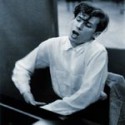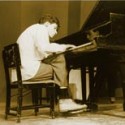
Glenn Gould
I have hated him ever since I heard his recording of Bach's Book 1 of the Well Tempered Clavier. The opening piece, the Prelude in C, should be smooth, liquid, effortless.
Instead Glenn Gould plays it with a bizarre phrasing that transforms it into a robotic, affected work that bears no resemblance to Bach's intention. I hate Gould because he could have played it beautifully and definitively, but chose not to.
He can be infuriating. Many of his recordings are so idiosyncratic as to be unlistenable. His recording of the Mozart piano sonatas are a case in point. He recorded them because of contractual obligations, but his dislike of Mozart is evident. Some of them he plays very blandly, others he mutilates with his cheeky genius.
But when he is good, he is very, very good. Gould can be astonishing, poetic, awe-inspiring. Listen to his recording of the Prelude in C-Sharp Major, BWV 872 from Book II of the Well-Tempered Clavier (And yes, that is Glenn you can hear singing in the background!). This is what makes Glenn Gould an enigma, an internal contrast. And very worth exploring.
Glenn Gould was born in Toronto in 1932. His genius for music was evident from an early age. He was playing the piano by 3, composing by 5, joined the Royal Conservatory of Music in Toronto at 10, gave his first public recital at 12, and his New York debut in 1955.
He was immediately signed up for a recording contract by CBS and his first recording was the Bach Goldberg Variations. It was an instant best-seller. He came full circle just before his death when he re-recorded the Goldberg Variations in 1982.

Glenn Gould singing
He lived a secluded life with close friends held at a distance. He expressed himself from behind recordings, broadcasts and writing, which revealed as much about him as they hid.
But he was never an eccentric for the sake of being an eccentric. His foibles were a real devotion to producing musical art. Idiosyncratic, definitely. Unusual, often. But showy, never.
Gould is best-known for his recordings of the works of Johann Sebastian Bach. Over his lifetime, he recorded almost all of Bach's keyboard works.
This in itself was revolutionary. Bach wrote most of his keyboard music as teaching exercises for his wife and sons, and this is how they were regarded by the public, rather than for concert performance or recording. Gould'srecording transformed these pieces into art.
Gould playing style was characterized by technical perfection and a clarity of line to the point of being Spartan. He was a master of bringing out a unique melodic line or phrasing, sometimes to the point of absurdity. It is as if Gould is saying "I am a genius, and I know it, so I play Bach my way, not Bach's way". Most of the time this works and is a revelation, but sometimes, as in the Prelude in C, it becomes comic.

Gould at the Piano
It may seem like this devotion to a desiccated clarity and precision is no way to art, but Gould achieves the impossible. By stripping the music of elaboration and embellishment, (and occasionally adding his own), by letting the tone of the recording be just pure music, the genius of Bach shines through. Gould loved Bach, and somehow, almost despite themselves, these recording exude warmth.




